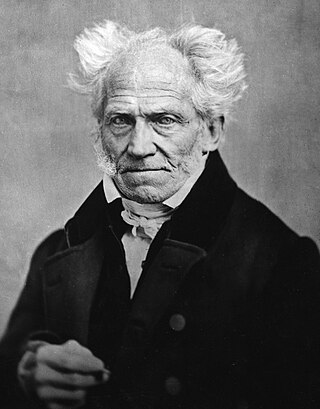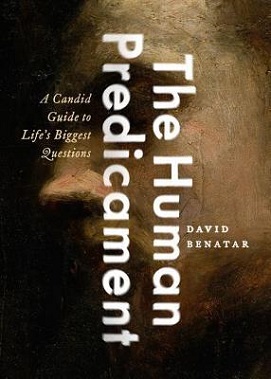Axiology is the philosophical study of value. It includes questions about the nature and classification of values and about what kinds of things have value. It is intimately connected with various other philosophical fields that crucially depend on the notion of value, like ethics, aesthetics or philosophy of religion. It is also closely related to value theory and meta-ethics. The term was first used by Eduard von Hartmann in 1887 and by Paul Lapie in 1902.
Hedonism refers to the prioritization of pleasure in one's lifestyle, actions, or thoughts. The term can include a number of theories or practices across philosophy, art, and psychology, encompassing both sensory pleasure and more intellectual or personal pursuits, but can also be used in everyday parlance as a pejorative for the egoistic pursuit of short-term gratification at the expense of others.
The problem of evil is the question of how to reconcile the existence of evil and suffering with an omnipotent, omnibenevolent, and omniscient God. There are currently differing definitions of these concepts. The best known presentation of the problem is attributed to the Greek philosopher Epicurus. It was popularized by David Hume.

Epicureanism is a system of philosophy founded around 307 BCE based upon the teachings of Epicurus, an ancient Greek philosopher. Epicurus was an atomist and materialist, following in the steps of Democritus. His materialism led him to religious skepticism and a general attack on superstition and divine intervention. Originally a challenge to Platonism, its main opponent later became Stoicism. Although Epicureanism is a form of hedonism insofar as it declares pleasure to be its sole intrinsic goal, the concept that the absence of pain and fear constitutes the greatest pleasure, and its advocacy of a simple life, make it very different from hedonism as colloquially understood. Following the Cyrenaic philosopher Aristippus, Epicurus believed that the greatest good was to seek modest, sustainable pleasure in the form of a state of ataraxia and aponia through knowledge of the workings of the world and limiting desires. Correspondingly, Epicurus and his followers generally withdrew from politics because it could lead to frustrations and ambitions that would conflict with their pursuit of virtue and peace of mind.

Misanthropy is the general hatred, dislike, or distrust of the human species, human behavior, or human nature. A misanthrope or misanthropist is someone who holds such views or feelings. Misanthropy involves a negative evaluative attitude toward humanity that is based on humankind's flaws. Misanthropes hold that these flaws characterize all or at least the greater majority of human beings. They claim that there is no easy way to rectify them short of a complete transformation of the dominant way of life. Various types of misanthropy are distinguished in the academic literature based on what attitude is involved, at whom it is directed, and how it is expressed. Either emotions or theoretical judgments can serve as the foundation of the attitude. It can be directed at all humans without exception or exclude a few idealized people. In this regard, some misanthropes condemn themselves while others consider themselves superior to everyone else. Misanthropy is sometimes associated with a destructive outlook aiming to hurt other people or an attempt to flee society. Other types of misanthropic stances include activism by trying to improve humanity, quietism in the form of resignation, and humor mocking the absurdity of the human condition.
In ethics, welfarism is a theory that well-being, what is good for someone or what makes a life worth living, is the only thing that has intrinsic value. In its most general sense, it can be defined as descriptive theory about what has value, but some philosophers also understand welfarism as a moral theory, that what one should do is ultimately determined by considerations of well-being. The right action, policy or rule is the one leading to the maximal amount of well-being. In this sense, it is often seen as a type of consequentialism, and can take the form of utilitarianism.
The absence of good, also known as the privation theory of evil, is a theological and philosophical doctrine that evil, unlike good, is insubstantial, so that thinking of it as an entity is misleading. Instead, evil is rather the absence, or lack ("privation"), of good. This also means that everything that exists is good, insofar as it exists; and is also sometimes stated as that evil ought to be regarded as nothing, or as something non-existent.

Antinatalism or anti-natalism is a family of philosophical views that are critical of reproduction — they consider coming into existence as bad or deem procreation as immoral. Antinatalists thus argue that humans should abstain from having children. Antinatalist views are not necessarily limited only to humans, but may encompass all sentient creatures, claiming that coming into existence is a harm for sentient beings in general.
David Benatar is a South African philosopher, academic, and author. He is best known for his advocacy of antinatalism in his book Better Never to Have Been: The Harm of Coming into Existence, in which he argues that coming into existence is serious harm, regardless of the feelings of the existing being once brought into existence, and that, as a consequence, it is always morally wrong to create more sentient beings.
Population ethics is the philosophical study of the ethical problems arising when our actions affect who is born and how many people are born in the future. An important area within population ethics is population axiology, which is "the study of the conditions under which one state of affairs is better than another, when the states of affairs in question may differ over the numbers and the identities of the persons who ever live."

In philosophy of mind, qualia are defined as instances of subjective, conscious experience. The term qualia derives from the Latin neuter plural form (qualia) of the Latin adjective quālis meaning "of what sort" or "of what kind" in relation to a specific instance, such as "what it is like to taste a specific apple — this particular apple now".
Negative utilitarianism is a form of negative consequentialism that can be described as the view that people should minimize the total amount of aggregate suffering, or that they should minimize suffering and then, secondarily, maximize the total amount of happiness. It can be considered as a version of utilitarianism that gives greater priority to reducing suffering than to increasing pleasure. This differs from classical utilitarianism, which does not claim that reducing suffering is intrinsically more important than increasing happiness. Both versions of utilitarianism hold that morally right and morally wrong actions depend solely on the consequences for overall aggregate well-being. "Well-being" refers to the state of the individual.
The Asymmetry, also known as 'the Procreation Asymmetry', is the idea in population ethics that there is a moral or evaluative asymmetry between bringing into existence individuals with good or bad lives. It was first discussed by Jan Narveson in 1967, and Jeff McMahan coined the term 'the Asymmetry' in 1981. McMahan formulates the Asymmetry as follows: "while the fact that a person's life would be worse than no life at all ... constitutes a strong moral reason for not bringing him into existence, the fact that a person's life would be worth living provides no moral reason for bringing him into existence." Professor Nils Holtug formulates the Asymmetry evaluatively in terms of the value of outcomes instead of in terms of moral reasons. Holtug's formulation says that "while it detracts from the value of an outcome to add individuals whose lives are of overall negative value, it does not increase the value of an outcome to add individuals whose lives are of overall positive value."
Yujin Nagasawa is a Japanese-born British philosopher specialising in the philosophy of religion, the philosophy of mind and applied philosophy.

The Conspiracy Against the Human Race: A Contrivance of Horror is a 2010 non-fiction book by American author Thomas Ligotti. Better known as a horror fiction author, with Conspiracy Ligotti offers a series of essays exploring his philosophical pessimism and antinatalist views. Among other sources, Ligotti cites Peter Wessel Zapffe's essay "The Last Messiah" and the writings of Emil Cioran (1911–1995) and Philipp Mainländer (1841–1876) as inspirations for his philosophical outlook. The book is noted for its repeated usage of the phrase "malignantly useless," as well as for the manner "in which philosophical thought and literary analysis converge" in his writings. In 2018, the book was re-released, with a new preface.
Suffering-focused ethics are those positions in ethics that give moral priority to the reduction of suffering. This means that they give greater weight to the reduction of suffering than to the promotion of pleasure, happiness, or to other things that one might consider valuable. According to some suffering-focused ethics, humans should concentrate exclusively on reducing preventable suffering. Other views can include additional features, such as the prevention of other disvalues or the promotion of other positive values, while giving priority to reducing preventable suffering over them.

The Human Predicament: A Candid Guide to Life's Biggest Questions is a philosophy book by David Benatar, which makes a case for philosophical pessimism, published by Oxford University Press in 2017. The book presents Benatar's views on a range of philosophical issues, arguing, among other topics, that having children is immoral, that death is bad despite much of human life being spent in suffering, and that suicide may be a morally justified action more often than is commonly assumed. The Human Predicament has been favorably compared to The Conspiracy Against the Human Race by Thomas Ligotti, the worldview presented in Ecclesiastes, and the works of philosopher Thomas Metzinger.

Philosophical pessimism is a family of philosophical views that assign a negative value to life or existence. Philosophical pessimists commonly argue that the world contains an empirical prevalence of pains over pleasures, that existence is ontologically or metaphysically adverse to living beings, and that life is fundamentally meaningless or without purpose. Philosophical pessimism is not a single coherent movement, but rather a loosely associated group of thinkers with similar ideas and a resemblance to each other. Their responses to the condition of life are widely varied. Philosophical pessimists usually do not advocate for suicide as a solution to the human predicament; many favour the adoption of antinatalism, that is, non-procreation.
Philosophical pessimism is a philosophical school critical of existence.
Benatar's asymmetry argument for antinatalism is an argument based on the difference between harms and benefits viewed in two scenarios — when the person in question exists and when the person in question never exists. The argument, introduced by David Benatar in his Better Never to Have Been, aims to establish that coming into existence is always a harm for the one who's coming into the world.







